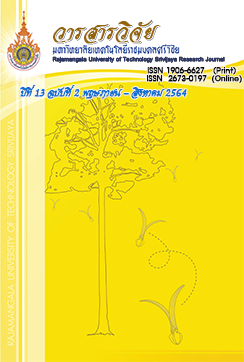Low-cost Solar Insolation Measurement System using Estimation Technique from the Brightness Sensor
Keywords:
solar insolation detector, low cost, estimationAbstract
This research presents study and design of low cost, high performance solar insolation measurement. The proposed measurement system consists of a brightness sensor that can measure brightness of UV, visible and infrared lights. Brightness values are then recorded into the data collection resources through the Arduino board, and these parameters are compared with the standard values. The experimental results show that visible light provided the best representative data for the standard solar insolation values with R2 of 0.98, followed by UV and infrared with R2 of 0.97 and 0.94, respectively. As a result, visible light was used to form the equation for determining the solar insolation, which was Isolar=246Xvis+ 126. The results also showed that the accuracy slightly decreased when the number of data samples decreased with the error rate less than 1%. with relatively low cost of 1,345 Baht (45 $US), which is 10-15 times lower compared to the standard measurement system.
References
Akarachantachote, N. and Saithanu, K. 2017. Using partial least square regression in the case of violations of regression model assumptions. Huachiew Chalermprakiet Science and Technology Journal 3(1): 69-75. (in Thai)
Hongpathong, J. and Numthuam, S. 2016. Method Development for Determination of Total Bacterial Amount in Raw Milk Using Near Infrared Spectroscopy, pp. 96-103. In Thaksin University Conference 26. Thaksin University, Songkhla. (in Thai)
Hong, T., Wang, P. and White, L. 2015. Weather station selection for electric load forecasting. International Journal of Forecasting 31(2): 286-295.
Janjai, S. 2014. Solar Radiation. 1st ed. Solar Energy Research Unit Department of Physics, Faculty of Science Silpakorn University, Nakhon Pathom. (in Thai)
Luewarasirikul, N., Sansomboon, A. and Ittipongse, A. 2012. Research Report no Study of The Intensity of Global Solar Radiation Incident in Suan Sunandha Rajabhat University. Suan Sunandha Rajabhat University. (in Thai)
Pattanasetthanon, S. 2005. Research Report no Conservation of electrical energy in buildings With natural light energy. Mahasarakham University. (in Thai)
Rukkhom, K., Khamruean, K. and Patcharaprakiti, N. 2017. A Weather Condition Data Logging and Monitoring System Via Wireless Zigbee. Journal of Innovative Technology Research 1(1): 55-70. (in Thai)
Sa-Ngiamvibool, W., Angkawisittpan, N., Nuan-on, A., Photong, C. and Kangrang, A. 2013. A Rain Gauge System using a Capacitance Sensor. International Journal of Engineering and Technology 5: 3596-3600.
Shabani, H., Ahmed, M.M. and Rose, A.H. 2017. Intelligent Greenhouse Monitoring and Control System Based Arduino UNO Microcontroller. Journal of Telecommunication Electronic and Computer Engineering 9: 3-10.
Suryabhagavan, K.V. 2017. GIS-based climate variability and drought characterization in Ethiopia over three decades. Weather Clim. Extrem 15(15): 11-23.
Downloads
Published
How to Cite
Issue
Section
License
The content and information in the article published in Journal of Rajamangala University of Technology Srivijaya It is the opinion and responsibility of the author of the article. The editorial journals do not need to agree. Or share any responsibility.







